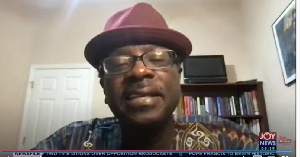- Home - News
- Elections 2024
- News Archive
- Crime & Punishment
- Politics
- Regional
- Editorial
- Health
- Ghanaians Abroad
- Tabloid
- Africa
- Religion
- Photo Archives
- Press Release
General News of Sunday, 1 June 2025
Source: www.ghanawebbers.com
Prof. Kwaku Asare shoots down Fiscal Council proposals
Ghana's public debt-to-GDP ratio is around 85% as of late 2024. The country is facing strict fiscal reforms from the International Monetary Fund (IMF). Amid this, there is a heated debate about creating an Independent Fiscal Council.
Professor Stephen Kwaku Asare, known as Kwaku Azar, opposes this idea. He calls it unnecessary and costly. He believes it duplicates existing state functions.
In a social media post on June 1, Prof. Asare criticized the push for new oversight bodies. He argues that Ghana has an "institutional fetish" for creating new structures instead of strengthening current ones.
He estimates that establishing the council could cost GH₵15-20 million annually. This includes expenses for a board, secretariat, salaries, and office infrastructure.
Prof. Asare noted that critical functions of a Fiscal Council already exist in current institutions. The Auditor-General’s Department ensures financial transparency and compliance with regulations. The Ministry of Finance handles macroeconomic forecasting and policy design. Parliamentary committees oversee government spending and fiscal policy.
He warned that a new council could delay decision-making processes. It might also increase governance costs without improving fiscal outcomes.
Instead, Prof. Asare suggests enhancing existing institutions' capabilities. He recommends investing in the Auditor-General's Department and the Budget Office.
A modest budget increase of 15-20% could help acquire advanced fiscal modeling software. Training 20-30 economic analysts would empower these bodies to take on proposed Fiscal Council functions.
"We must resist creating new committees for every reform challenge," he cautioned. "Neglecting existing structures shows misplaced confidence in form over function."
Prof. Asare believes an Independent Fiscal Council would be redundant in Ghana's context. He advocates focusing on strengthening established fiscal oversight bodies for better management.











